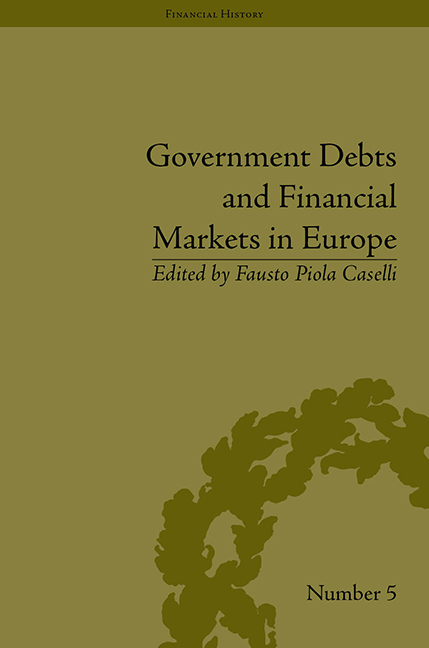Book contents
- Frontmatter
- CONTENTS
- Contributors
- List of Charts and Tables
- Introduction
- 1 The Financial Administration of North Hanseatic Cities in the Late Middle Ages: Development, Organization and Politics
- 2 Government Debts and Credit Markets in Renaissance Italy
- 3 Government Debts and Financial Markets in Castile between the Fifteenth and Sixteenth Centuries
- 4 Government Debt and Financial Markets: Exploring Pro-Cycle Effects in Northern Italy during the Sixteenth and the Seventeenth Centuries
- 5 Government Policies and the Development of Financial Markets: The Case of Madrid in the Seventeenth Century
- 6 The Role Played by Short-Term Credit in the Spanish Monarchy's Finances
- 7 From Subordination to Autonomy: Public Debt Policies and the Creation of a Self-Ruled Financial Market in the Kingdom of Naples in the Long Run (1500–1800)
- 8 Public Debt in the Papal States: Financial Market and Government Strategies in the Long Run (Seventeenth–Nineteenth Centuries)
- 9 Towards a New Public Credit Policy in Eighteenth-Century Spain: the Introduction of the Tesorería Mayor de Guerra (1703–6)
- 10 French Public Finance between 1683 and 1726
- 11 Long-Term War Loans and Market Expectations in England, 1743–50
- 12 Mercantilist Institutions for the Pursuit of Power with Profit: The Management of Britain's National Debt, 1756–1815
- 13 Italian Government Debt Sustainability in the Long Run, 1861–2000
- 14 Times of Wasteful Abundance: The Apogee of the Fiscal State in the Federal Republic of Germany from the 1960s to the 1980s
- Conclusion: Final Remarks
- Notes
- Bibliography
- Index
5 - Government Policies and the Development of Financial Markets: The Case of Madrid in the Seventeenth Century
- Frontmatter
- CONTENTS
- Contributors
- List of Charts and Tables
- Introduction
- 1 The Financial Administration of North Hanseatic Cities in the Late Middle Ages: Development, Organization and Politics
- 2 Government Debts and Credit Markets in Renaissance Italy
- 3 Government Debts and Financial Markets in Castile between the Fifteenth and Sixteenth Centuries
- 4 Government Debt and Financial Markets: Exploring Pro-Cycle Effects in Northern Italy during the Sixteenth and the Seventeenth Centuries
- 5 Government Policies and the Development of Financial Markets: The Case of Madrid in the Seventeenth Century
- 6 The Role Played by Short-Term Credit in the Spanish Monarchy's Finances
- 7 From Subordination to Autonomy: Public Debt Policies and the Creation of a Self-Ruled Financial Market in the Kingdom of Naples in the Long Run (1500–1800)
- 8 Public Debt in the Papal States: Financial Market and Government Strategies in the Long Run (Seventeenth–Nineteenth Centuries)
- 9 Towards a New Public Credit Policy in Eighteenth-Century Spain: the Introduction of the Tesorería Mayor de Guerra (1703–6)
- 10 French Public Finance between 1683 and 1726
- 11 Long-Term War Loans and Market Expectations in England, 1743–50
- 12 Mercantilist Institutions for the Pursuit of Power with Profit: The Management of Britain's National Debt, 1756–1815
- 13 Italian Government Debt Sustainability in the Long Run, 1861–2000
- 14 Times of Wasteful Abundance: The Apogee of the Fiscal State in the Federal Republic of Germany from the 1960s to the 1980s
- Conclusion: Final Remarks
- Notes
- Bibliography
- Index
Summary
The rise of the modern state during the early modern period could hardly been explained without taking into account the development of the first national fiscal systems. To achieve their political objectives the European kings had to increase their revenues, introducing new taxes, promoting all kind of reforms to improve the efficiency of their fiscal systems and curtailing the social and regional privileges enjoyed by certain social groups and territories. Yet in most cases this was not enough. As expenditures were usually well above revenues, most European monarchies and republics had to borrow, and this paved the way for the expansion of the first public debt systems which, in the cases of the Dutch Republic and England, led to the development of advanced financial markets.
In the Spanish and, particularly, Castilian cases, during the sixteenth and seventeenth centuries the Crown's fiscal revenues experienced a substantial rise, especially in the last quarter of the sixteenth century and the central decades of the seventeenth. This was not enough, however, to finance the Habsburg fight for European hegemony and the Spanish kings had to rely on all kinds of measures to provide them with the funds needed. Among them, borrowing had a prominent place, but the importance of public debt should not hide the fact that there were other ways of supplying the Crown's needs, and this paper tries to analyse one of them: the alienation to Madrid of a significant part of the Crown's fiscal ordinary revenues in return for monetary subsidies.
The process began in 1653 and lasted until 1679. At its end, the Crown had transferred to its capital most of the servicio de millones collected in Madrid and its fiscal district in return for substantial monetary subsidies, which could be described as forced loans (donativos).
- Type
- Chapter
- Information
- Government Debts and Financial Markets in Europe , pp. 67 - 80Publisher: Pickering & ChattoFirst published in: 2014



